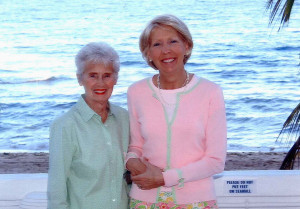 In July of 2003 at the age of 52, my mother, Cissy Hart, was diagnosed with ovarian cancer. Despite the fact that her mother died of ovarian and breast cancers also at the age of 52, this news came as a huge shock to my mother and our family. My mother was enrolled in a high-risk ultrasound study to detect such cancers and had been tested only six months prior with no concern. In addition, my mother had been told by a doctor in the 1970’s that my grandmother developed her cancer due to hormones given to her, therefore my mom never believed there was much of a hereditary risk.
In July of 2003 at the age of 52, my mother, Cissy Hart, was diagnosed with ovarian cancer. Despite the fact that her mother died of ovarian and breast cancers also at the age of 52, this news came as a huge shock to my mother and our family. My mother was enrolled in a high-risk ultrasound study to detect such cancers and had been tested only six months prior with no concern. In addition, my mother had been told by a doctor in the 1970’s that my grandmother developed her cancer due to hormones given to her, therefore my mom never believed there was much of a hereditary risk.
 Detection of My Mother’s Ovarian Cancer
Detection of My Mother’s Ovarian Cancer
In the spring of 2003, my mother began to complain of kidney pain. Her urologist detected kidney stones in an X-ray and began treatment. He explained that she had some scar tissue blocking her kidney causing the stones to form. Her pain did not ease as we all expected, but instead grew increasingly worse. In late June and early July, Mom’s stomach began to swell and a high fever set in. Due to the swelling, she appeared to be about four months pregnant and she was in serious pain.
She finally decided to go see her family practitioner who ran some tests (including a CA 125 test) and decided she probably had ovarian cancer. He then directed Mom to a gynecological oncologist, and two days later she went in for surgery. Several days after that, the lab results came back to confirm the diagnosis of ovarian cancer.
The Prohibitive Costs of Gene Testing
The test would cost approximately $3000 for my mother to be tested. There are more than 600 mutations of the BRCA 1 gene to test for and approximately 450 mutations of the BRCA 2 gene to test for, and it can take several weeks to get the results. In addition, our counselor told us the test may or may not be covered by insurance and we would need to wait to hear back from the insurance company to see if Mom’s genetic testing would be covered.
Almost one month after we submitted the request to the insurance company, we still had not heard back. Mom had taken a turn for the worse and after she ended her chemotherapy, the cancer began to spread again. A lump formed on her breast and we believe it may have been breast cancer as well. She did not have any tests run to determine this because the ovarian cancer was taking over her body.
The Genetic Information Non-Discrimination Act (GINA)
We began to wonder if the genetic testing was going to happen. My parents had already spent several thousand dollars out of their pockets in the past couple years, and paying $3000 for a test that would not help my mother’s prognosis or aid in her treatment did not seem to be a necessary course of action. My father’s parents decided the tests needed to happen for the benefit of my sister, my children, and me. My grandparents declared they would pay for the genetic testing if insurance wouldn’t.
Mom had the genetic testing done the next week and within three weeks of having her blood drawn we got the results, learning she tested positive for a strain of the BRCA 1 gene. We are extremely grateful for my grandparents’ graciousness, for, had they not offered, Mom may not have had the testing. My mother died within two months of being tested; however, now that the strain of the gene running in our family had been determined, other family members could be tested for approximately $350 each.
Testing for the BRCA Gene
My aunt, my two cousins, my sister, and I all had the genetic test performed to see if we had the BRCA gene. My sister and I both tested positive for BRCA 1 but our aunt and cousins tested negative. My mother’s brother would have been at risk for male breast cancer as well as an increased risk of prostate cancer if he had been BRCA positive. He died in the Vietnam War so we don’t know if the gene had been passed to him.
Preventative Measures
Our genetic counselor gave us options of things we could do to lower our chances of getting ovarian and breast cancers. Medications could lower our chances by as much as 50% and surgery could lower our chances for breast cancer to less than the general public as well as lower our ovarian cancer risk by 90%. My sister and I both opted for surgery.
At the age of 29, I had a double mastectomy and reconstructive surgery. My sister had the same surgery at the age of 25. We both are very pleased with the outcome and neither of us have any regrets. We will both have a complete hysterectomy once our families are complete.
November 2006 – March 2007
 In late November 2006, upon completion of my breast reconstruction surgery, I became pregnant. The pregnancy was not planned and came as a shock. We had not dismissed the possibility of having another child either and were not 100% convinced our family was complete. This is the reason I chose not to have the prophylactic hysterectomy immediately after I completed the prophylactic double mastectomy and reconstruction process.
In late November 2006, upon completion of my breast reconstruction surgery, I became pregnant. The pregnancy was not planned and came as a shock. We had not dismissed the possibility of having another child either and were not 100% convinced our family was complete. This is the reason I chose not to have the prophylactic hysterectomy immediately after I completed the prophylactic double mastectomy and reconstruction process.
When I should have been about seven weeks into the pregnancy, the first ultrasound showed the baby had not developed properly. The doctor let me know that either I was not as far along as we originally thought or that the pregnancy may end with a miscarriage. Sure enough, a few weeks later I miscarried the baby. There is no joy in a losing a child. But looking back, the miscarriage probably saved my life; a blessing in disguise.
We had been through a lot of tough times the past couple years and it was time for a family vacation. So in mid February 2007, Benji, the kids, and I went to Disney World and then to visit my grandparents at the beach. The time away with our children allowed Benji and I to affirm to each other that God had blessed us with wonderful children and our family was complete. At the same time, it was a hard week to endure. I began experiencing a shooting pain in my right ovary that would come and go. I also had quite a bit of bloating, a sign of ovarian cancer. Although ovarian cancer was an unlikely scenario at my age, I couldn’t get the thought out of my mind.
Immediately upon returning home from our trip, I consulted my gynecologist and my mom’s gynecological oncologist. They did not see anything abnormal on the ultrasound and seemed to think that it was most likely a ruptured ovarian cyst which caused the pain. After my physician consultations, the pain was still lurking and it bothered me, physically and mentally. I hadn’t come this far to take any more chances and my family was complete. It was time for the prophylactic hysterectomy.
On March 3, 2007, at the age of 29, almost one year after my mom passed away, I had a complete hysterectomy. My recovery time was quick and I felt good. But ten days later, on Friday the 13th, during a follow up visit from the surgery, I was given the pathology report and diagnosed with Stage 1a Epithelial Ovarian Cancer. It was there, in the center of my right ovary, the same aggressive, cellular makeup as my mom’s cancer. There was no sign of a ruptured cyst, but ovarian cancer had developed. Shock was an understatement. The doctors think it is unlikely for the pain in my right ovary to be caused by the small amount of cancer that was found. Many women don’t feel ovarian cancer even when it is in much later stages.
Having my breasts removed within a month of my mother’s death and then reconstructed over the next few months without her there to support me was not easy. An elective hysterectomy in the prime of child bearing years was a hard decision to make; especially when my pain was thought to be a only a ruptured cyst. I am thankful I had the courage to make these decisions, beginning with the genetic test. They all have saved my life. I feel like the genetic testing has given me a second chance at life! It is a second chance that my mother and grandmother knew nothing about.
I don’t know what God has in store for me, my family, or the National Gene Test Fund in the years to come. But I am looking forward to the challenge of finding out. I have been blessed with the ability to view bad situations in a positive light and encourage others to face their fears head on! I constantly remind myself that my problems are not a punishment, but rather the opportunity to experience God in my life.
“And we know that in all things God works for the good of those who love him, who have been called according to his purpose.” -Romans 8-28
Giving Back: The Development of NGTF
My husband and I want to thank my grandparents again for agreeing to pay for the genetic test if insurance would not. The test may have saved my life and the lives of my children. For the graciousness of my grandparents we are forever grateful, and that is why this foundation has been formed. We would like to help other families pay for the genetic tests they may need in order to make medical decisions concerning their health, well-being, and their future.